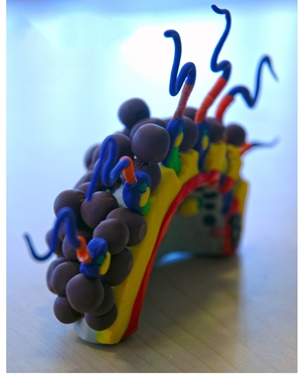NEWS
Exhibit combines biological sciences, art to show student learning outcomes
Students in Dr. Brandon Moore’s spring quarter Biology of Reproduction class at Louisiana Tech University recently completed one of the most unique and innovative project assignments they will ever experience.
Moore, an assistant professor of biological sciences in Louisiana Tech’s College of Applied and Natural Sciences, tossed aside the traditional paper exam and collaborated with Mary Louise Carter, an associate professor of ceramic art, to challenge his students to use their artistic talents to create sculptures and visual presentations of their scientific concepts in biological reproduction. The completed projects were presented to teams of judges, which were comprised of one biologist and one academician from another discipline on campus.
“The instruction of the class was designed to challenge the students not only to consume and retain the knowledge gained during their coursework, but more specifically, to foster those skills to produce something using that knowledge and to demonstrate an ability to communicate that knowledge to others,” said Moore. “This can be summed up in the mantra, ‘The value of science is contingent on effective communication leading to common ownership of knowledge.’”
Moore’s students also shared their artistic expressions of biological concepts with the campus and local communities in a gallery exhibit at the Louisiana Tech Enterprise Center.
“Models and Moving Pictures: Visual Communication of the Complexity of Biological Reproduction” showcased the students’ artistic adaptations of biological science and provided them with an opportunity to sharpen their presentation and communications skills as they explained the depth and complexity of the science underlying their artwork. The exhibit required a substantial understanding of concepts by the students, so they can translate the scientific “jargon” for non-scientists.
Moore says the projects and the gallery exhibit represent a higher form of learning experience resulting in the ability to produce something substantial and to further educate.
“This experience was pursued by way of the construction of clay teaching models, hands-on exercises teaching anatomy, drawing complex biological principals to incorporate both right and left brain, and producing short stop-motion films,” Moore said. “It’s how we’re able to dynamically and creatively teach a reproductive biology concept.”
Moore’s course and the interdisciplinary nature of the project exemplify one of Louisiana Tech’s primary educational philosophies. Tech has built a reputation for encouraging faculty from a variety of different disciplines to join forces and collaborate on developing new and innovative programs that will provide new learning opportunities and experiences for students. Several such academic and research programs have already been established between multiple colleges and departments at Louisiana Tech.
